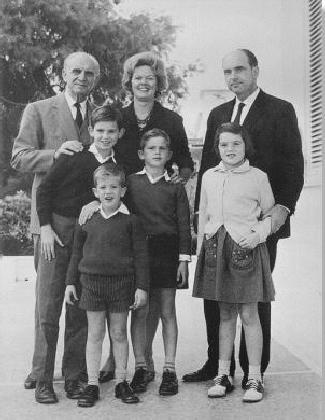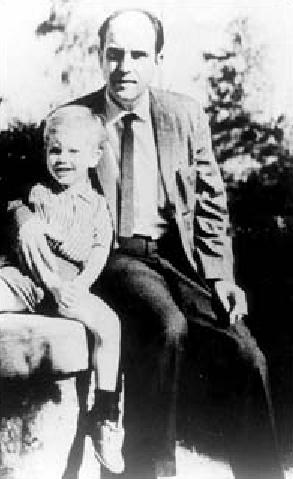
Andreas Papandreou (Greece, 1919-96)

Figure 1.--This 1962 image of the Papandreou family shows Papandreou with his father, wife, and four children in 1962. The photo
was taken at their house at Kastri in Athens. The family had just returned from the United States. The boys wear informal sweaters with long and short pants. The girl wears saddle shoes. I'm not sure to what extent the clothing was influenced by U.S. fashions, but the styles look rather American.
|
Andreas Papandreouu is one of the best known Greek statesman and comes from a distinguished Greek family. The story of the Papandreou family begins on Chios Island and then continues to Patras, the United States, Athens, Sweden, Canada, and finally back to Athens). W know littlke about his childhood. He is recognized as Greek academic, politician, and statesman. He served as , Prime Minister of Greece (1981-1989, 1993-1996). He was born on the Aegean Island of Chios. His is the son of former Prime Minister Georgios Papandreou. He studied at the University of Athens and Harvard University. He served in the U.S. Navy and became a naturalized U.S. citizen. He returned to Greece to become the country's first Socialist Prime Minister, although many prommised reforms were not achieved. He had three sons and a daughter.
Parents
His is the son of former Prime Minister Georgios Papandreou and Sophia Meneiko.
Childhood
We know little about his childhood other than he was
born on the Aegean Island of Chios.
Childhood Clothing
We have little information on the clothes Andreas wore as a boy. A HBC reader reports that Andreas wore sailor suits. A photograph taken with his father shows him with with long curly hair. Most photographs of Greek children show them with very short hair.
Education
Papandreou graduated from Athens University Law School. He later studied at the Harvard University after being exiled from Greece. His academic training was in law and economics.
Exile
Papandreou was arrested in 1939 for political activities during the Metaxa
dictatorship. After his release, he left Greece for the United States.
United States
He earned his PhD in Economics from Harvard University in 1943. Having become an U.S. citizen, he enlisted in the U.S. Navy to fight in World War II.
After the War he persued a career in college teaching, and he taught in the United States, at the University of Minnesota (1951-1955) and the University of California at Berkeley (1955-1963). He specialized in areas like economic theory and method, industrial organisation, theory and method of economic policy and planning, comperative economic systems, and economic delopment. Like many academic economists of his era he was commited to a statist approach to economic issues and expansive government involvement in the economy which accorded with his Socialist political views.

Figure 2.--This photograph shows Papandreou with with his youngest son Adrikos (Andreas), I'm not sure when it was tken.
|
Return to Greece
He returned to Greece in 1961, renouncing his
US citizenship, to head the Centre of Economic Research and advise the Bank of Greece. He served in his father's personal prime ministerial office during 1964 and
became Minister for Economic Coordination in 1965. It was in this year that he entered Greek politics, winning election to the Greek parliament.
He was imprisoned by a mikitary junta led by Georgios Papadopoulos in April 1967. He succeeded in escaping Greece in December. The following year founded and led the Pan-Hellenic Liberation Movement (PAK). He returned to academia, holding teaching chairs at the Stockholm University (1968-1969) and York University in Canada (1969-1974).
When the Junta collapsed in 1974, Papandreou returned to Greece to enter politics again. He founded the Pan-Hellenic Socialist Movement (PASOK). He waa the leader of the official opposition party from 1977 and 1981. He won the election in 1981.
Prime Minister
Papandreou served as Prime Minister of Greece (1981-1989, 1993-1996) winning three general elections. He was Greece's first Socialist Prime Minister. He resonated with the Greek public through populist rhetoric and despite living in the West, an anti-Western platform. He constantly threatened to withdraw from the North Atlantic Treaty Organization (NATO) and the European Economic Community (EEC). Neither was the domestic economic reform he exposed was not achieved on the scale promised. After several political, financial, and personal scandals, Papandreou resigned in 1989. He remained active in politics and in 1993 PASOK achieved another electoral victory. This brought his second period as prime minister.
Educational Reform
The whole Papandreou family was very interesting in educational reform. George Papandreou (Andreas' father) served as a Minister of Education in 1930. During that
time a lot a schools were built in remote areas. In 1964, as a Prime Minister he abolished the school cap and introduced the simple spoken modern greek language in schoo teaching
(demotiki). Andreas Papandreou, as Prime Minister, abolished the use of complicated
accentuation marks in Greek language in 1981 and school uniforms in 1982. We do not at this time, however, have information about the debate on this issue. George Papandreou Jr. (the elder son) also served as a Minister of Education in the mid 90s. A HBC reader who studied under him reports that he was an excellent teacher.
Private Life
Papandreou met and mairred his wife Maragaret in the United States. They had four children, three sons and a daughter, all of wom were birn in the United States. In July 1989 he married the Olympic Airways hostess Dimitra Liani, divorcing Margaret.
Childen's Clothes
One image of Papandreou family shows Papandreou with his father, wife, and four children in 1962. They had just returned from the United States. The boys wear unformal sweaters with long and short pants. The girl wears saddle shoes. I'm not sure to what extent the clothing was influenced by U.S. fashions, but the styles look rather American.
Final Years
Papandreou was hospitalized in late November 1995 with kidney and lung ailments. The Papandreou finally announced his resignation as Prime Minister in a written
statement from his hospital bed on January 15, 1996. A younger reformist, Costas Simitis, assumed the leadership of PASOK. He recovered for a brief period anf supported conservative factions in PASOK. He passed away June 1996.
Christopher Wagner

Navigate the Boys' Historical Clothing Web Site:
[Return to Main M-R biography page]
[Return to Main biography page]
[Return to Main Greek page]
[Introduction]
[Activities]
[Biographies]
[Chronology]
[Clothing styles]
[Countries]
[Bibliographies]
[Contributions]
[FAQs]
[Glossaries]
[Satellite sites]
[Tools]
[Boys' Clothing Home]
Created: April 27, 2002
Last updated: April 30, 2002




